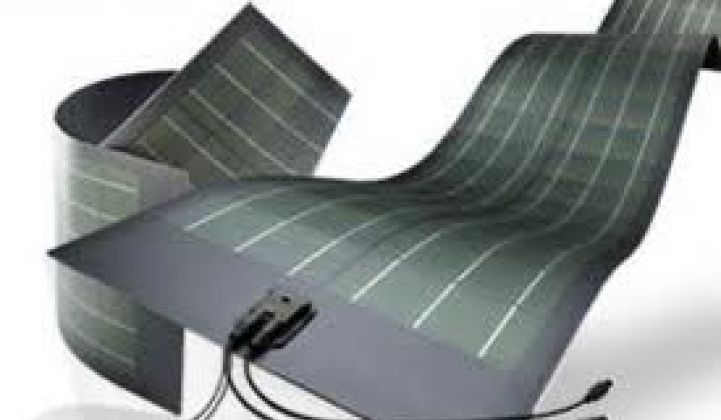China's Hanergy now owns Arizona's Global Solar Energy (GSE).
GSE was founded almost twenty years ago by UniSource Energy and ITN Energy Systems. Solon acquired Global Solar for $16 million in 2006.
The plummeting cost of crystalline silicon solar panels from China has eroded the value proposition of CIGS thin-film solar, which has so far failed to live up to its promises of low cost and competitive efficiency.
Back in December 2012, Tucson-based GSE laid off about 95 of its employees and ceased operations. The company had a product line of portable solar charging equipment, flexible modules and building-integrated PV (BIPV). Global Solar had been selling CIGS products on a flexible substrate for more than eight years and was notable for its small but real production volumes of 11-percent-efficient solar cell product.
Planning to become the "global leader in flexible thin-film solar," Hanergy now adds Global Solar Energy to its collection of CIGS companies, which already includes Solibro and MiaSolé.
Hanergy just announced that "it has completed the equity acquisition of Global Solar Energy, Inc., a manufacturer with the world’s leading copper indium gallium diselenide (CIGS) solar technology," adding that "the acquisition follows approval from the Committee on Foreign Investment in the United States and the National Development and Reform Commission, the regulators governing cross-border acquisitions in the U.S. and China, respectively."
A statement adds, "In the past year, Hanergy has acquired Solibro and MiaSolé, both leading players in the CIGS technology field. Those transactions took the conversion rate of Hanergy’s thin-film PV modules to an unrivaled 15.5%. The acquisition of GSE closes the loop of Hanergy’s strategic consolidation of technologies that combine the competitive advantages of flexible thin-film PV modules and large scale production. It also demonstrates Hanergy’s continued leadership and commitment to developing advanced thin-film technology, and is a further step in its investment in leading CIGS technology and efficient alternative cell materials."
In June 2012, Hanergy acquired Solibro, the CIGS operations belonging to Germany's Q-Cells. It's a curious move, because there's not a lot of synergy between the deposition processes of the two firms. MJ Shiao of GTM Research's Solar Division points out that MiaSolé uses a roll-to-roll sputtering process, while Solibro uses a batch coevaporation process and that's "pretty much the opposite end of the spectrum, as far as CIGS deposition goes." Global Solar Energy uses a coevaporation process.
Since it is unlikely that Hanergy is amassing a defensible CIGS PV intellectual property stance, it truly appears that Hanergy is going deep into CIGS thin film just when the U.S. CIGS effort has diminished to a few staunch technologists. Sources have indicated that it's more than just Hanergy which believes China can win in CIGS. Chinese solar tariffs favoring flexible PV and BIPV won't hurt Hanergy's cause, either.
GSE will become a wholly owned subsidiary of Hanergy, an 8,000-employee wind and hydropower developer which claims to have entered into solar-power plant construction agreements with a combined capacity of approximately 10 gigawatts.
Solar Frontier, the leader in CIGS production, sells 13-percent-efficient modules, along with Stion, TSMC, Solexant and a few other CIGS players that continue to soldier on in this materials system.



